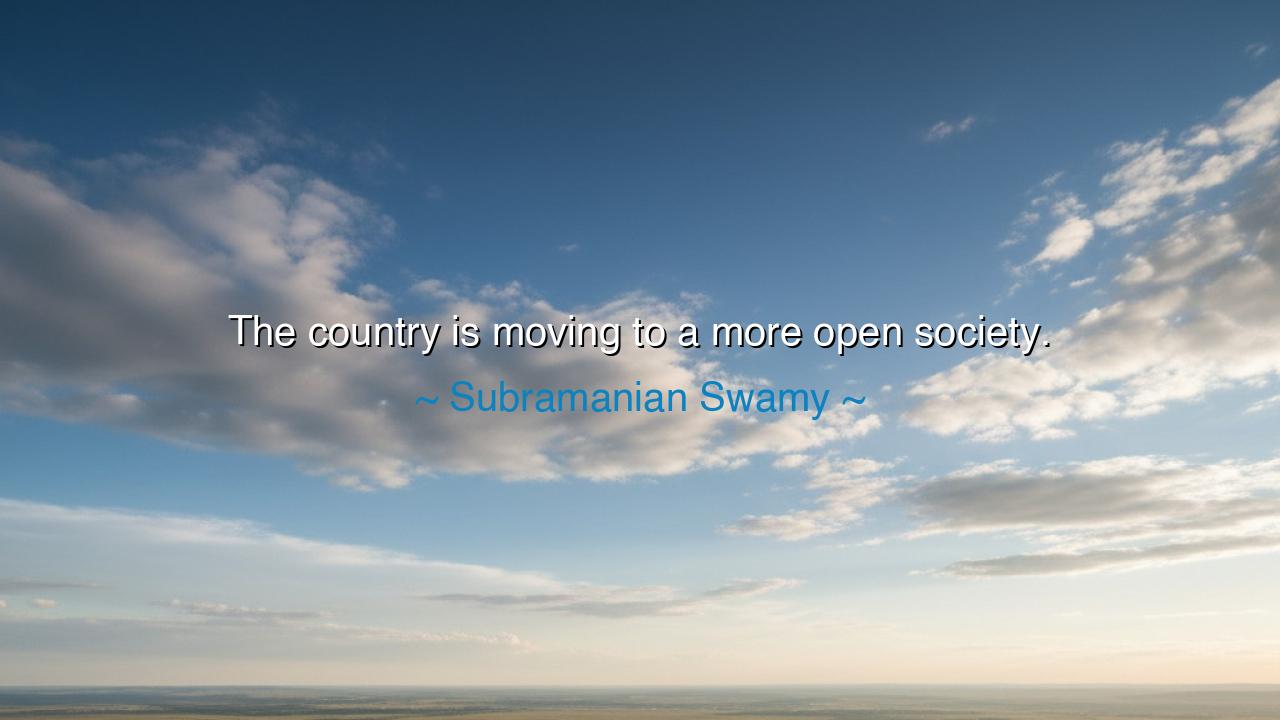
The country is moving to a more open society.






Hear the words of Subramanian Swamy, who declared with conviction: “The country is moving to a more open society.” These words, though simple, carry the weight of ages. They are not merely about laws or markets, but about the very soul of a nation learning to breathe freely. To be an open society is to cast off the chains of secrecy, fear, and repression, and to walk instead in the light of truth, transparency, and participation. Such a society does not close its ears to criticism, nor its doors to new ideas, but welcomes them, for it knows that openness is the foundation of strength.
The origin of this thought lies in India’s turbulent journey through modern times. Swamy, a scholar and politician, has witnessed decades of change—from colonial rule to independence, from socialism to liberalization, from rigid structures to increasing freedom in both economics and speech. When he speaks of a nation moving toward a more open society, he reflects not only on India but on all nations that struggle between the pull of control and the call of liberty. His words are both observation and prophecy: that history bends toward openness, even if the path is slow and marked by resistance.
The ancients themselves knew the power of openness. Recall the Athenians, who built one of the first democracies. Though imperfect and limited, they laid the groundwork for the idea that the voice of the citizen mattered, that debate and dissent were not enemies of the state but its lifeblood. In their open assemblies, ideas clashed, but from that clash came philosophy, art, and a vision of freedom that echoes across the centuries. Just so, Swamy’s words remind us that the journey to openness is never easy, but it is the path by which civilizations rise.
History gives us another example in the fall of the Berlin Wall in 1989. For decades, Eastern Europe had been cloaked in secrecy and repression, its societies closed to free thought and movement. Yet the people yearned for openness, and their voices grew too loud to silence. When the wall crumbled, it was more than concrete that fell—it was the symbol of a closed world giving way to the dawn of freedom. This is the very essence of Swamy’s teaching: that nations, when they evolve, move always toward the light of a more open society.
The meaning of his words is both hopeful and cautionary. Hopeful, because they tell us that progress is real—that nations can change, that freedoms can expand, that the human spirit longs for openness. Cautionary, because openness must be guarded. For there will always be forces that seek to close society again, to build walls of fear, to silence voices. A more open society is not a gift to be received once, but a garden to be tended daily, lest weeds of oppression grow again.
What lesson, then, shall we take from this? That openness is not only the task of governments, but of individuals. To listen before judging, to welcome new ideas, to allow the other a voice—these are the acts that weave the fabric of an open people. And we must demand transparency in leaders, justice in courts, fairness in markets, and equality in rights. For when each person honors openness in their own life, the nation itself is strengthened.
Therefore, children of the future, engrave this teaching upon your hearts: the destiny of every nation is to move toward openness. Do not resist it, do not fear it, but embrace it. Guard it as you would your freedom, nourish it as you would your soul. For in an open society, truth is spoken, justice is pursued, and the human spirit flourishes. And as Swamy reminds us, when a country moves toward openness, it moves toward its truest greatness, for only in the light can a nation truly thrive.






AAdministratorAdministrator
Welcome, honored guests. Please leave a comment, we will respond soon